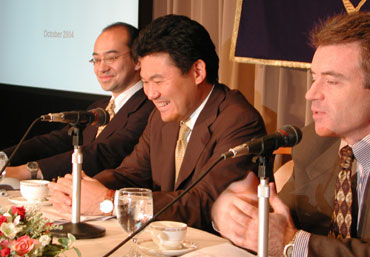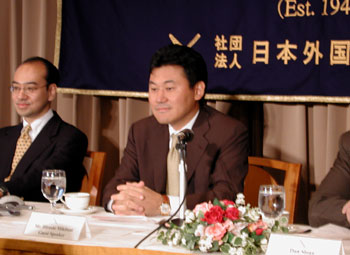Where Eagles Dare: Rakuten to
Play Hard Ball
The Baseball Series > Matsuzaka > Trey Hillman > Gyroball > Kazuhiro Yamauchi > Bobby V. > Rakuten
Temporarily setting aside his paper
and typewriter, the
Captain this week finds himself dusting off his legendary
pitching skills for Japanšs newest pro baseball team owner
- Hiroshi Mikitani of Rakuten. Does the Captain's curve still
have enough bite to turn a few heads? Dig your back foot into
the batter's box and see for yourself...
Hie entered the game in the
late innings but still managed to hit one out of the park.
 Hiroshi
Mikitani, president and CEO of online shopping mall Rakuten,
was last week awarded by Nippon
Pro Baseball the opportunity to start a new Pacific League
franchise in Sendai, the major metropolis of Japan's Tohoku
region.
Hiroshi
Mikitani, president and CEO of online shopping mall Rakuten,
was last week awarded by Nippon
Pro Baseball the opportunity to start a new Pacific League
franchise in Sendai, the major metropolis of Japan's Tohoku
region.
"If we have new blood in the league, with
innovative ideas, we will be able to turn the industry around,"
Mikitani explained at a recent press conference at the Foreign
Correspondents' Club of Japan before the decision was announced
last week.
After a contentious audition with Livedoor,
another Japan-based Internet company, Rakuten's triumph and
future infusion of "innovative ideas" could possibly
be a changing of the guard in the business.
"Many successful Japanese people have
tried for a long time to turn the baseball business around,"
the 39-year old entrepreneur said of the actions (or lack
thereof) of the current cabal of NPB owners. "I respect
their efforts; I have no doubt that they have tried their
best."
Current ownership represents a near hall-of-fame
roster of companies within industries - mainly in the transportation,
retail, and newspaper sectors - that have lagged considerably
since the bursting of Japan's economic bubble over a decade
ago. Mikitani and his Tohoku Rakuten Golden Eagles club are
set to change the baseball business in Japan and score a few
runs in the process.
Mikitani's motivations are many. For one, there
is the prestige. Ownership of a ball club is a measure of
success given the importance baseball plays within Japanese
culture.
But he's also very open with the fact that he wants to extend
his company's brand name. He hopes involvement in baseball
will boost sales at his company, a shopping website boasting
28 million users that sells everything from wrist watches
to travel packages.
Others in the industry have similar sentiments.
In recent weeks, the Internet investment company Softbank
has reportedly been involved in negotiations to buy the Fukuoka
Daiei Hawks club, whose parent company has been on the verge
of bankruptcy for the last several years. Livedoor, the Internet
services company which threw the first new ownership pitch
when it attempted to purchase the Kintetsu Buffaloes last
season, has been reported (ever since its loss to Rakuten
for the Sendai team) to now be switching its attention to
buying the financially struggling Seibu Lions franchise, the
controlling company of which is now mired in a scandal involving
securities fraud.
Much of this activity is a spillover from events
that took place over the summer. The proposed merger between
the Kintetsu Buffaloes and the Orix Blue Wave resulted in
the sport's first (labor) strike, a one-weekend affair that
was settled when the players and owners agreed that another
team would be added to bring the number of Pacific League
teams back to six. When Livedoor president Takafumi Horie's
offer to purchase the Buffaloes was denied, he later applied
along with Mikitani to start the new team in Sendai.
 The
battle for Sendai included presentations by both presidents
and extensive question and answer sessions before a five-member
NPB panel. Rumors spread later that the adult content on Livedoor's
website and Rakuten's superior financial standing were important
elements in Mikitani's victory.
The
battle for Sendai included presentations by both presidents
and extensive question and answer sessions before a five-member
NPB panel. Rumors spread later that the adult content on Livedoor's
website and Rakuten's superior financial standing were important
elements in Mikitani's victory.
At present, NPB clubs show balance sheets as
attractive as stale Cracker Jacks. When the merger talks were
initiated with Orix, the Buffaloes were said to be reporting
a loss of more than 30 million dollars a year. The unraveling
of the Seibu
scandal revealed a loss of 20 million dollars for this year's
Japan Series champions.
Most would shy away from investing in such
an industry, and given that the Eagles will be slotted into
the less attractive Pacific League - a truism since the monstrously
popular Yomiuri Giants help to prop up most of the teams in
the Central - what then makes Mikitani think he can do better?
"What they (the owners) are telling me
is that they are losing so much money - 25 million, 30 million,
35 million (dollars)," he said. "It is very difficult
to lose 30 million dollars."
For Mikitani, profit will be a priority. He
will start by renovating the 54-year-old, 25,000-capacity
Miyagi Stadium, abandoning plans submitted by major construction
firms for the building of an all-weather dome due to the fact
that very few domes in Japan are profitable.
He expects to spend 27 million dollars on the
aging facility, whose confines are considered slightly cramped
by baseball standards (left and right field lines measure
just 300 feet from home), in two phases; one will conclude
in March of next year and the second will take place during
the following off-season.
Getting help from the outside will be crucial
for Mikitani as well. In addition to attaining corporate sponsorships
from companies for such necessities as uniforms, Mikitani
has turned to the Miyagi Prefectural Government, which anticipates
a baseball boost to the local economy of 120 million dollars
annually. The government offered Rakuten the use of the stadium
for around a half million dollars, a discount of 70 percent.
Mikitani noted that most NPB teams pay between 10 and 20 million
dollars for use of their stadiums.
Broadcasting and gate revenue could be larger
than before for Pacific League clubs next year. Interleague
play will begin and the Eagles will host three match-ups with
the cash-cow Giants and Hanshin Tigers.
"If you go to Tohoku, there is a large
Giants crowd but I think we will be able to beat them (in
competing for fans)," he laughed, knowing full well that
even with 9.8 million people living in the six Tohoku prefectures,
competing with the nationwide popularity of the Yomiuri club
will be tough to do.
Though such a prediction by Mikitani, who brings
a Harvard MBA to the plate, is mainly rooted in pre-season
swagger, such a comment is consistent with his style; he exudes
confidence.
After acquiring over twenty companies for Rakuten,
which opened for business in 1997, he indicated that he feels
he is suited to take on baseball operations next. He also
said that a lot of his ideas are from his experience in running
Vissel Kobe, the J-league soccer franchise.
Mikitani has already hired a number of coaches
and staff. Though he admits he won't be able to throw large
sums of cash at big-name free agents, like slugging outfielder
Tuffy Rhodes, Mikitani isn't worried about fielding a competitive
team: "It's going to be tough but I'm confident."
Marty Kuehnert, a longtime Tokyo hand with
experience in various managerial capacities in the MLB minor
leagues, will be working the phones to get a starting lineup
ready before next spring. Of Kuehnert, Mikitani said, "One
of the most important issues is to bring someone who doesn't
have a relationship with the old Japanese business community."
 The
tactics of this "old" community has been the stuff
of legend. The inflation of game attendance totals, rampant
bribery scandals, and associations with gangsters
by NPB barons has called their integrity into question on
many occasions.
The
tactics of this "old" community has been the stuff
of legend. The inflation of game attendance totals, rampant
bribery scandals, and associations with gangsters
by NPB barons has called their integrity into question on
many occasions.
Mikitani will instead provide a "crystal
clear" disclosure of the team's books and actions. "I
am not telling any other team that they should do it. I'm
just saying we are going to do it."
Not all of the hallmarks of NPB, however, will
be abandoned. Rakuten's corporate name will be firmly placed
within the team name. This practice has been used by teams
past and present, from meat packers to drink companies. Mikitani
predicted that this will be the case until the team can turn
a profit, something he thinks could take place a few years
down the road.
Mikitani feels he can set an example for young
people through his entrepreneurial spirit. His reason for
starting Rakuten had nothing to do with garnering fame; it
was more about showing that goals can be achieved through
aggressive actions.
"I just wanted to show to younger people
that if you work real hard, and become very innovative, that
you can become successful."
The first pitch for the Eagles will come in
April 2005.
The Baseball Series > Matsuzaka > Trey Hillman > Gyroball > Kazuhiro Yamauchi > Bobby V. > Rakuten

